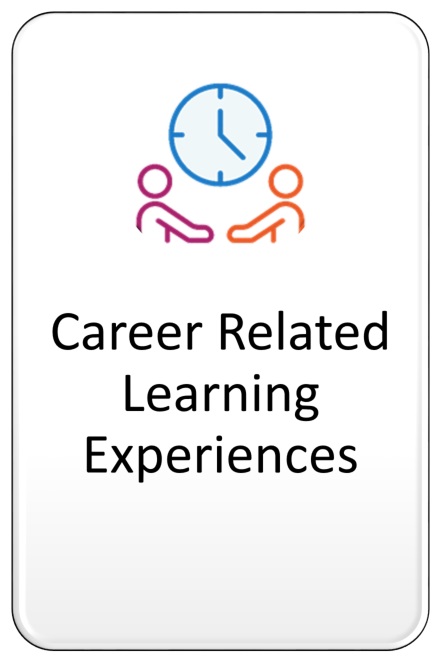
“All students should receive a good foundation in the basics to the best of their capabilities, but the most important part of attending high school is to discover inspiration to pursue what interests them.” - Oregon Resident
Career-Related Learning Experiences are structured educational experiences that connect learning to the world beyond the classroom. When students participate in these activities, they are better able to imagine their future career pathways and plan for life after high school.
The Career-Related Learning Experiences are planned and documented in the student’s Education Plan and Profile in relation to their career interests, aptitudes and post-high school goals. These experiences provide opportunities for students to apply academic, career-related, and technical knowledge and skills, and may also help students to clarify career goals.
Some examples of Career-Related Learning experiences include, but are not limited to, field-based investigations, field trips, guest speakers, job shadows, service learning, school-based enterprises, workplace mentoring, and workplace simulation.
Process
Students participate in structured activities in the community, workplace, or school that connect to both academic content and careers. These can include, but aren’t limited to, the following:
- Job shadows
- Workplace and Business/Industry field trips
- Career-centered guest speakers
- Workplace mentoring
- Workplace simulations
- School-based enterprises
- Service learning
- Field-based investigation
- Structured work experiences
- Cooperative work and study programs
- On-the-job training
- Service learning
- Internships
- Pre-apprenticeships
- Apprenticeship programs
Product
A document or collection of evidence, included in the Education Plan and Profile, of each student’s Career-Related Learning Experiences
- A record of the student’s participation in career-related activities
- Progress towards any larger goals (badges, CTE concentrations, etc.)
This handbook provides a shared resource for schools, districts, business, industry, and community partners in support of a statewide effort to build a robust work-based learning ecosystem in Oregon.
The rubric was designed to be used by teachers, administrators, and other individuals to develop and evaluate work-based learning experiences for students.
YouScience helps students to identify their natural talents, skills, and aptitudes which help them better select their educational pathways, and find best matched in-demand jobs. This platform is available free of charge to Oregon middle and high schools who are participating in an extended Middle School Career Exploration Pilot Project. Please contact
Susan Samek for more information.
Examples from Oregon
Hillsboro
State-mandated Requirements
(OAR 581-022-2055,
OAR 581–22-2000,
OAR 581-22-0102)
Each school district shall implement plans for career education for grades K through 12, as part of its comprehensive school counseling program, based on the Oregon Department of Education’s Framework for Comprehensive School Counseling Programs. Career education curriculum is part of the overall comprehensive school counseling curriculum, written to address Essential Skills, Education Plan and Education Profile and the four interrelated student developmental domains: academic, career, social/emotional, and community involvement.
Each student shall participate in career-related learning experiences outlined in the education plan.
Career-Related Learning Experiences are structured student activities in the community, the workplace, or in school that connect academic content and career-related learning to real life applications. These experiences extend, reinforce and support classroom learning. They include, but are not limited to:
- Workplace mentoring;
- Workplace simulations;
- School-based enterprises;
- Structured work experiences;
- Cooperative work and study programs;
- On-the-job training;
- Apprenticeship programs;
- Service learning; and
- Field-based investigations.
For more information on this topic, please contact
Kristidel McGregor